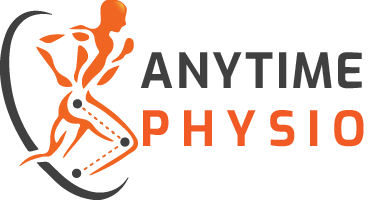PHYSIOTHERAPY FOR SHOULDER PAIN
Learn how we treat shoulder pain
at Anytime Physio
OUR TEAM OF PHYSIOTHERAPISTS ARE EXPERTS IN SHOULDER PAIN
Shoulder pain and injuries can be debilitating. It can severely impact day to day activities like getting dressed, doing the laundry and getting things done at work. It can stop you from enjoying sports, working out at the gym and even wake you up if you roll onto the painful shoulder in bed. The physiotherapists at Brisbane Anytime Physio understand the importance of good shoulder health and can help you diagnose and treat your shoulder pain.
INTRODUCTION TO THE SHOULDER
The shoulder is the most mobile joint in the body. It is made up of the glenoid at the end of the scapula (shoulder blade), the humeral head at the top of the arm bone, the supporting ligaments, the labrum and the interarticular cartilage. Because of its mobility, the shoulder is particularly susceptible to injuries and dysfunctions in movement control.
WHO GETS SHOULDER PAIN?
Shoulder pain is most common in people who are involved in work that requires repetitive use of the arms in overhead positions. These overhead positions increase the loads applied to the rotator cuff muscles and tendons as well as the bursa of the shoulder. This can lead to irritation and pain in the shoulder.
Shoulder pain is also common in people who train with weights in the gym. Muscle imbalances, such as tightness of the pectoralis minor and weakness of the serratus anterior and lower trapezius, can lead to increased load on the rotator cuff tendons during weight training. This can lead to symptomatic impingement with tendinopathy and bursitis.
COMMON SHOULDER CONDITIONS
Below is a list of the most common injuries involving the shoulder. Please remember that this list is not exhaustive and that, in many cases, pain does not have to involve any one particular structure.
- Fractures
- Dislocations
- Rotator cuff sprains, strains and tears
- Supraspinatus injuries
- Infraspinatus injuries
- Teres minor injuries
- Subscapularis injuries
- Shoulder bursitis (typically subacromial bursitis or subdeltoid bursitis)
- Tendinopathy – also called tendinosis, previously called “tendinitis”
- Labral injuries (SLAP tears, biceps anchor tear)
- Shoulder instability Acromioclavicular joint (AC joint) injuries and pain
- Cervical radiculopathy (referred pain from the neck)
- Thoracic outlet syndrome
- Osteoarthritis
- Rheumatoid arthritis
Remember that this list is not exhaustive. There are many reasons why knees can hurt (and some of them don’t even involve the shoulder).
BOOK WITH ONE OF OUR EXPERT PHYSIOTHERAPISTS
Get started on your treatment today by booking your appointment with one of our Physiotherapists. Alternatively call of clinic on 07 3733 0944.
ACUTE SHOULDER INJURY MANAGEMENT
If you’ve just injured your shoulder, here are a few tips to get you on the road to recovery. Please remember that this advice is general and does not constitute medical advice.
Rest From Aggravating Activities
Identify the positions and movements that aggravate your shoulder pain. Pain is a protective mechanism and is used to help you avoid further irritation of injured tissues that need time to heal. In the acute recovery phase, it is important to give the shoulder a break from loading and painful movements.
Apply Ice for Shoulder Pain Relief
Ice should be applied in the early stages of recovery. 20 minutes on every 2 hours is a great way to reduce swelling in the shoulder in the first 48 to 72 hours after an injury. After this time, heat can be applied to help relax the muscles around the shoulder and to increase circulation in the area to increase metabolic rates for healing.
Book An Appointment with a Physiotherapist
Our Physiotherapists are experts in assessing and treating shoulder pain and injuries. We see them everyday and know each step of successful rehabilitation. Physiotherapy for shoulder pain involves identifying potential structures involved in the injury and the factors that led to the injury in the first place and designing a recovery plan suited to your specific condition. Treatment options include hands-on manual therapy, massage, exercises to improve mobility and motor control of the shoulder and scapula.
Need Help With Your Shoulder Pain?
Book an appointment online with one of our expert Brisbane physiotherapists.









